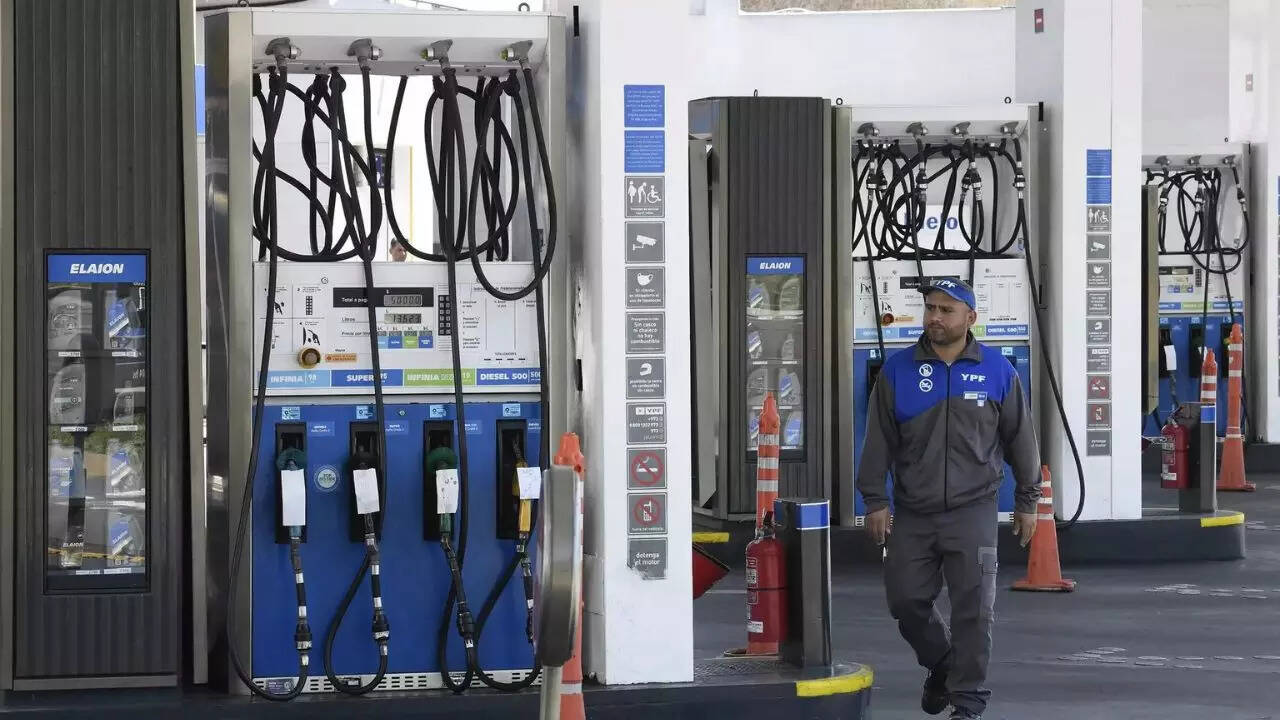BUENOS AIRES: Argentina‘s fuel crisis deepened on Monday as filling stations around Buenos Aires ran out of petrol and long queues formed elsewhere, while the government said it could halt exports to preserve supplies and oil sector workers threatened a strike.
The South American country, a major shale oil and gas producer, has suffered shortages of petrol and diesel since late last week because of domestic refining problems and as a lack of dollars has delayed imports.
The crisis is damaging the government ahead of a second-round presidential election run-off next month between the ruling Peronist coalition’s economy chief Sergio Massa, seen as the front-runner, and a radical libertarian Javier Milei.
Around the capital, Reuters reporters saw empty filling stations with signs saying no more petrol. In other places, long queues formed and some rationed sales.
Oil executives cited planned halts at local refineries, which provide 80% of domestic supply, and the country’s scarce foreign currency reserves that have held up imports.
“It’s not a problem of lack of crude oil, the problem is that there’s no more processing capacity with the refineries we have in Argentina,” said one industry source, asking not to be named because he was not authorised to speak to the media.
“On top of that, you need dollars to pay for imports and the central bank does not have them. And even when they do import, the refining companies make a loss selling at the pump below the price they are buying,” the source said.
Argentina’s government has fixed a local oil price at $56 per barrel, far below the international price around $86 to try to calm local inflation of nearly 140%. That skews the economics for firms importing product from overseas.
Export halt threat
During the weekend Economy Minister Massa told oil companies they must solve the domestic supply crisis by the end of Tuesday or the government would halt crude oil export shipments from the huge Vaca Muerta shale formation.
“I am going to defend the internal supply, I am going to defend the consumption of Argentines,” he said.
Local unions backed Massa’s position and threatened a strike from Wednesday unless the domestic situation was resolved. They said crude production was at a record and the oil companies were being “opportunistic and petty”.
A second industry source, also declining to be named, also said that the issue was not output, but issues in refining the crude oil and the hurdles to bringing in imports.
Halting shipments from Vaca Muerta would not help, the source said.
In Argentina’s farmlands, producers said a shortage of diesel showed signs of abating, key for the start of the planting season of soy and corn, the country’s main cash crops that are needed to replenish depleted foreign currency reserves.
“It is not completely normalized but there is a little more supply,” Jorge Chemes, the head of the Argentine Rural Confederations (CRA), told Reuters on Monday.
The South American country, a major shale oil and gas producer, has suffered shortages of petrol and diesel since late last week because of domestic refining problems and as a lack of dollars has delayed imports.
The crisis is damaging the government ahead of a second-round presidential election run-off next month between the ruling Peronist coalition’s economy chief Sergio Massa, seen as the front-runner, and a radical libertarian Javier Milei.
Around the capital, Reuters reporters saw empty filling stations with signs saying no more petrol. In other places, long queues formed and some rationed sales.
Oil executives cited planned halts at local refineries, which provide 80% of domestic supply, and the country’s scarce foreign currency reserves that have held up imports.
“It’s not a problem of lack of crude oil, the problem is that there’s no more processing capacity with the refineries we have in Argentina,” said one industry source, asking not to be named because he was not authorised to speak to the media.
“On top of that, you need dollars to pay for imports and the central bank does not have them. And even when they do import, the refining companies make a loss selling at the pump below the price they are buying,” the source said.
Argentina’s government has fixed a local oil price at $56 per barrel, far below the international price around $86 to try to calm local inflation of nearly 140%. That skews the economics for firms importing product from overseas.
Export halt threat
During the weekend Economy Minister Massa told oil companies they must solve the domestic supply crisis by the end of Tuesday or the government would halt crude oil export shipments from the huge Vaca Muerta shale formation.
“I am going to defend the internal supply, I am going to defend the consumption of Argentines,” he said.
Local unions backed Massa’s position and threatened a strike from Wednesday unless the domestic situation was resolved. They said crude production was at a record and the oil companies were being “opportunistic and petty”.
A second industry source, also declining to be named, also said that the issue was not output, but issues in refining the crude oil and the hurdles to bringing in imports.
Halting shipments from Vaca Muerta would not help, the source said.
In Argentina’s farmlands, producers said a shortage of diesel showed signs of abating, key for the start of the planting season of soy and corn, the country’s main cash crops that are needed to replenish depleted foreign currency reserves.
“It is not completely normalized but there is a little more supply,” Jorge Chemes, the head of the Argentine Rural Confederations (CRA), told Reuters on Monday.
